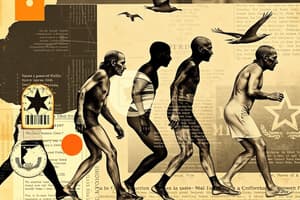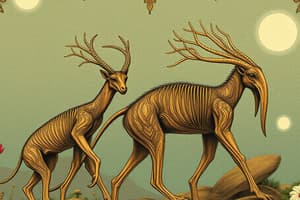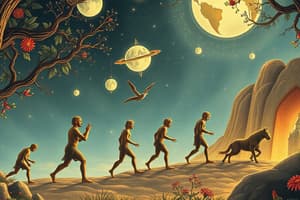Podcast
Questions and Answers
What does the term "historia" mean?
What does the term "historia" mean?
Inquiry or an account of one's inquiries.
What is the difference between prehistory and history?
What is the difference between prehistory and history?
Prehistory is the time before people developed the art of writing, while history is the study of the past beginning from when writing and recording started.
Why is history considered a systematic study?
Why is history considered a systematic study?
History is a systematic study because historical study follows established rules, procedures, and standards.
What is the primary purpose of dating in history?
What is the primary purpose of dating in history?
What are the 2 main objectives of studying history?
What are the 2 main objectives of studying history?
Historians try to determine the exact time when events occurred by using specific methods.
Historians try to determine the exact time when events occurred by using specific methods.
Which of these statements is true?
Which of these statements is true?
Which of the following are examples of primary sources?
Which of the following are examples of primary sources?
Secondary sources are often considered more reliable than primary sources as they are filtered through expert analysis.
Secondary sources are often considered more reliable than primary sources as they are filtered through expert analysis.
How does the study of history help in the development of critical thinking skills?
How does the study of history help in the development of critical thinking skills?
What is historiography?
What is historiography?
What are the benefits of studying history?
What are the benefits of studying history?
Why is history important for the development of societies?
Why is history important for the development of societies?
Flashcards
History
History
The study of human actions and events in the past. It began roughly 5,500 years ago with the development of writing.
Prehistory
Prehistory
The time before writing was developed. Archaeologists and Anthropologists study this period.
Chronology
Chronology
The arrangement of events in the order that they happened. Uses calendars (Gregorian, Ethiopian, Islamic) to track time.
Human Evolution
Human Evolution
Signup and view all the flashcards
Genus (in Biology)
Genus (in Biology)
Signup and view all the flashcards
Family (in Biology)
Family (in Biology)
Signup and view all the flashcards
Bipedalism
Bipedalism
Signup and view all the flashcards
Ardipithecus ramidus
Ardipithecus ramidus
Signup and view all the flashcards
Australopithecus afarensis (Lucy)
Australopithecus afarensis (Lucy)
Signup and view all the flashcards
Homo habilis
Homo habilis
Signup and view all the flashcards
Homo erectus
Homo erectus
Signup and view all the flashcards
Homo sapiens
Homo sapiens
Signup and view all the flashcards
Historiography
Historiography
Signup and view all the flashcards
Historical Interpretation
Historical Interpretation
Signup and view all the flashcards
Primary Source
Primary Source
Signup and view all the flashcards
Secondary Source
Secondary Source
Signup and view all the flashcards
Oral Tradition
Oral Tradition
Signup and view all the flashcards
Dating (in History)
Dating (in History)
Signup and view all the flashcards
Decade
Decade
Signup and view all the flashcards
Century
Century
Signup and view all the flashcards
Millennium
Millennium
Signup and view all the flashcards
Timeline
Timeline
Signup and view all the flashcards
Periodization
Periodization
Signup and view all the flashcards
Evolutionary Theory
Evolutionary Theory
Signup and view all the flashcards
Natural Selection
Natural Selection
Signup and view all the flashcards
Neolithic Period
Neolithic Period
Signup and view all the flashcards
Paleolithic Period
Paleolithic Period
Signup and view all the flashcards
State of Being
State of Being
Signup and view all the flashcards
Chronicles
Chronicles
Signup and view all the flashcards
Critical Thinking
Critical Thinking
Signup and view all the flashcards
Opinion
Opinion
Signup and view all the flashcards
Fact
Fact
Signup and view all the flashcards
Study Notes
Unit Introduction
- This unit familiarizes students with the methodology of history, helping them learn the subjects more successfully
- The lessons in this unit cover pre-history and history, the discipline of history and human evolution, theories on the origin of humans, Africa, and the Stone Age
- The emergence of states is examined
- Major points and arguments in examples and images are used to make learning interesting
- A summary of each lesson and review questions are provided
Unit Learning Outcomes
- Discuss the main objectives of studying history
- Evaluate the place of Africa and Ethiopia in human evolution
- Summarize the theories on the origin of state and its major features
Key Terms
- Prehistory
- History
- Chronology
- Human Evolution
- State
Studying That Suits You
Use AI to generate personalized quizzes and flashcards to suit your learning preferences.




